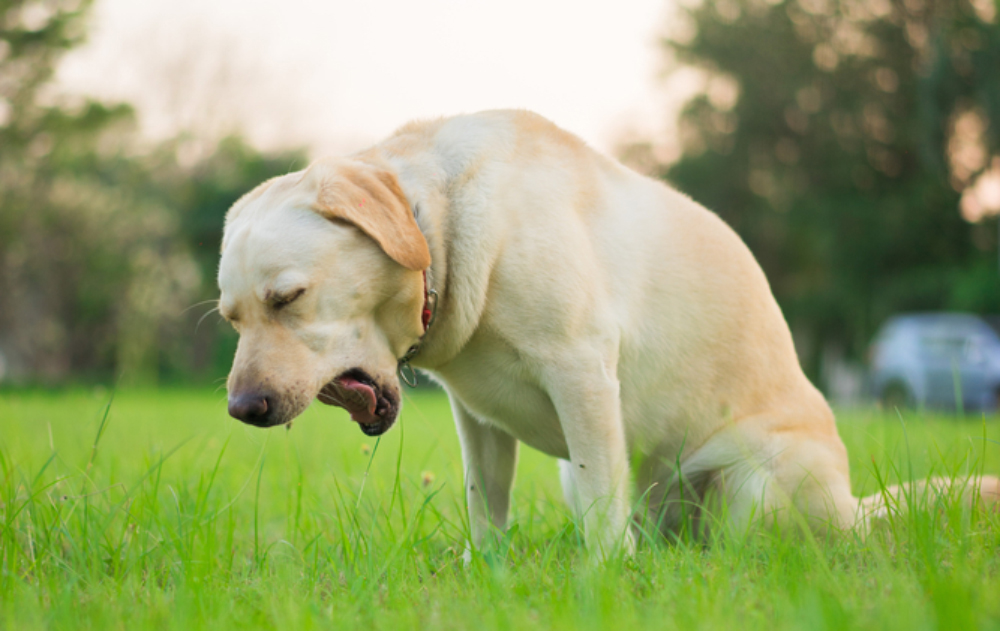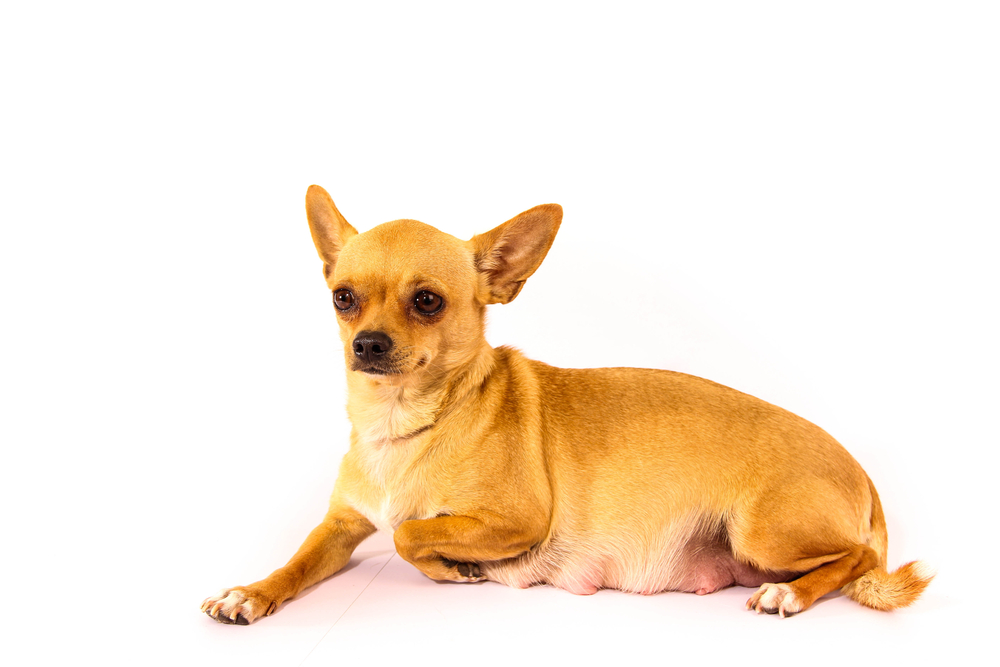Click to Skip Ahead
Your dog is heaving at the foot of your bed, and you’re not sure why. Contacting your veterinarian is essential because some of the possible reasons can be dangerous to leave untreated. Let’s look at why your dog might be dry heaving.
What Is Dry Heaving in Dogs?
You may already know what dry heaving is, but many people don’t. It is a retching motion, basically going through the motions of vomiting but not producing anything. In some cases, your dog might produce small amounts of bile or foamy material while dry heaving.

The 5 Reasons for Dog Dry Heaving
There are several reasons why your dog might be dry heaving.
1. Gastroesophageal Reflux Disease
Some dogs have gastric reflux that contributes to dry heaving. Stomach acid passes back up into the esophagus, irritating it. Other signs of this condition include pacing, licking the lips, and regurgitation.
Your veterinarian might suggest a trial of an acid-reducing medication such as famotidine (Pepcid), but they will likely also recommend blood work and radiographs (X-rays) to rule out other issues.
2. Foreign Body Lodged in the Throat
If your dog likes to chew on things, such as tennis balls or other objects, they can fit in their mouth and get something stuck in their throat. If your dog is dry heaving, the veterinarian can examine its throat and see if anything is lodged there. You could end up bitten by your dog if you try to get a foreign body out of its throat, so be careful and contact your veterinarian if a foreign body is possible.
3. Respiratory Infections
Respiratory infections are common in dogs and can be triggered by viruses, bacteria, and even fungal organisms. Many respiratory illnesses are contagious. Some dogs produce a honking cough, some dry heave, and some have a runny nose. Viral respiratory infections are often self-limiting, but some dogs require supportive care.

4. Gastric Dilatation Volvulus (Bloat)
A GDV is a potentially life-threatening condition that occurs more commonly in deep-chested dogs like Great Danes. When a dog develops bloat, the stomach distends with air, sometimes fluid, and flips around. In addition to the stomach contents being unable to go out of this organ in any direction, the blood supply to the stomach and sometimes the spleen can get cut off.
Dogs with GDV may pace, stretch, show a distended abdomen, collapse, or even suddenly die. This condition is a surgical emergency.
5. Tumor Obstructing the Throat
Like a foreign body obstructing your dog’s throat, a tumor in the neck can cause a complete or partial airway obstruction. Your veterinarian might be able to feel a swelling, but others might be less noticeable. Your veterinarian might need to perform advanced imaging to determine the cause.
Diagnosing the Cause of Dry Heaving in Your Dog
Some dogs need emergency intervention with rapid diagnostics and treatment. Many times, veterinarians will recommend blood work and radiographs (X-rays) to assess your dog’s heart, lungs, and throat. Imaging the stomach is also important because that is how a GDV is usually diagnosed.
Depending on what your vet finds during your pup’s exam, they’ll recommend treatment, such as medication to help with a cough or surgery to treat a GDV. In some cases, such as gastric reflux, your veterinarian might suggest that you feed your dog smaller, more frequent meals during the day, including a “midnight snack” before bed.
If you have a video of your dog dry heaving, bring it to your veterinarian. In some cases, it can help differentiate between coughing, vomiting, and regurgitation, all of which are treated differently.
PangoVet. It’s an online service where you can <b>talk to a vet online</b> and get the personalized advice you need for your pet — all at an affordable price!
</p>
<div class="su-button-center"><a href=https://www.dogster.com/ask-the-vet/"https://pangovet.com/?utm_source=dogster&utm_medium=article%22 class="su-button su-button-style-default" style="color:#FFFFFF;background-color:#FF6600;border-color:#cc5200;border-radius:9px;-moz-border-radius:9px;-webkit-border-radius:9px" target="_blank" rel="nofollow"><span style="color:#FFFFFF;padding:0px 24px;font-size:18px;line-height:36px;border-color:#ff944d;border-radius:9px;-moz-border-radius:9px;-webkit-border-radius:9px;text-shadow:none;-moz-text-shadow:none;-webkit-text-shadow:none"> Click to Speak With a Vet</span></a></div></div></div>"}" data-sheets-userformat="{"2":513,"3":{"1":0},"12":0}"> If you need to speak with a vet but can’t get to one, head over to PangoVet. It’s an online service where you can talk to a vet online and get the personalized advice you need for your pet — all at an affordable price!

Frequently Asked Questions (FAQ)
Should I be concerned about my dog dry heaving?
An occasional, solitary episode of dry heaving is usually no reason to worry about your dog. If your dog keeps dry heaving, something is wrong, and you should contact your veterinarian. Dogs with lethargy, nasal discharge, weakness, or trouble breathing should be assessed by a veterinarian immediately.
What do you give a dog that is dry heaving?
You should not give your dog anything without speaking to your veterinarian about dry heaving. Because there are many potential causes of dry heaving, and some can be deadly if not addressed immediately, you should have your vet involved in the diagnostic and treatment process.

Conclusion
Dogs with dry heaving should be assessed by a veterinarian, especially if they have other signs of illness. The underlying cause determines the dog’s treatment and prognosis, so diagnostics and a complete physical exam are essential.
Featured Image Credit: Dhanoo Surasarang, Shutterstock











